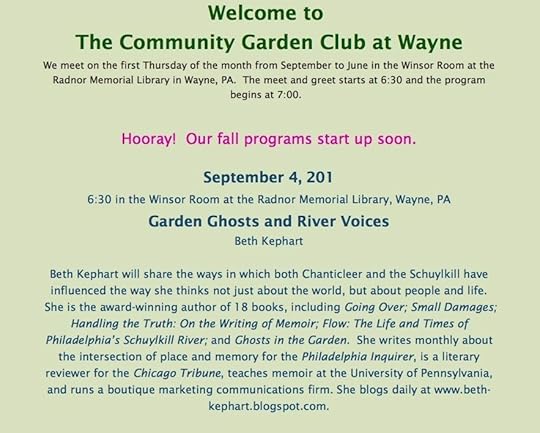Beth Kephart's Blog, page 76
August 11, 2014
where is man's truth to be found?

All of us have had the experience of a sudden joy that came when nothing in the world had forewarned us of its coming—a joy so thrilling that if it was born of misery we remembered even the misery with tenderness. All of us, on seeing old friends again, have remembered with happiness the trials we lived through with those friends. Of what can we be certain except this—that we are fertilized by mysterious circumstances? Where is man's truth to be found?
— Antoine de Saint-Exupery




Published on August 11, 2014 05:50
August 10, 2014
chasing the moon—and avoiding the siren's song of historical research
 Last night I went in search of the super moon. Drove up and down Lancaster Avenue only to return home to discover that the best views were from my own front lawn.
Last night I went in search of the super moon. Drove up and down Lancaster Avenue only to return home to discover that the best views were from my own front lawn.Earlier this week, Adam Levine, a dear friend, a water guy, a streams and sewer guy, and a man who possesses (I believe) the most complete knowledge of my city's vast and dispersed historical archives, came for an afternoon of cupcakes and talk. We drifted, as we tend to, toward talk of recently found photographs, newly discovered treasure troves, the idea of the lost and found inside the city's libraries and files. At one point we began to talk about how generative research is in the early stages of making a book—and how potentially paralyzing later on.
Earlier this morning, reading this week's edition of Printers Row (Chicago Tribune) rather than writing the the Tribune essay now due (an occupational hazard), I came upon an essay describing a new book—Curiosity's Cats: Writers on Research (edited by Bruce Joshua Miller). A must-buy, I'm already thinking.
And there, tumbling out of the end of the essay (penned by Miller himself), was the very sentiment Adam and I agreed on Thursday afternoon. I can't adequately express how wholeheartedly I agree with this thought. I pass it on to you:
My advice to writers is “research but write.” Don’t wait until you have gathered every conceivable fact or explored every area of interest. Put the collection away and start typing. Avoid what the novelist Margot Livesey calls in her essay, research’s “siren song.”




Published on August 10, 2014 10:04
August 9, 2014
shaping the past, distancing ourselves: George Packer and David Brooks
 Two recent pieces by George Packer and David Brooks reflect on the ways we delineate and shape the past. We must distort because we must compress, Packer tells us, but there are consequences. Brooks, relying on science such as Critical Incident Stress Debriefing, suggests that meaningful perspective is best gained by putting time and distance between ourselves and our histories.
Two recent pieces by George Packer and David Brooks reflect on the ways we delineate and shape the past. We must distort because we must compress, Packer tells us, but there are consequences. Brooks, relying on science such as Critical Incident Stress Debriefing, suggests that meaningful perspective is best gained by putting time and distance between ourselves and our histories.I tag the key quotes here—to save them for myself, to share them with you, to ask what you think of it all.
The nature of historical writing, of memory itself, is to distort by selecting and compressing events, making the past seem more dramatic and coherent than it ever was.... Narrative history, in bringing the past to life, asks us only to forget about the other turns we might have made. — George Packer, "The Uses of Division," The New Yorker, August 11/18 2014
When people examine themselves from too close, they often end up ruminating or oversimplifying. Rumination is like that middle-of-the-night thinking — when the rest of the world is hidden by darkness and the mind descends into a spiral of endless reaction to itself. People have repetitive thoughts, but don’t take action. Depressed ruminators end up making themselves more depressed.... We are better self-perceivers if we can create distance and see the general contours of our emergent system selves — rather than trying to unpack constituent parts. This can be done in several ways. — David Brooks, "Introspective or Narcissistic?", The New York Times, August 7, 2014




Published on August 09, 2014 04:34
August 8, 2014
a teen reader speaks about Small Damages
and because I so appreciate her taking the time to read and to record her thoughts, I post her video here.




Published on August 08, 2014 09:30
my son, still writing that snappy dialogue, shares his work here
 It seems a lifetime ago that I opened the doors to our modest home and the children came in. Young storytellers, readers, dramatists who were willing to spend a summer evening collaboratively writing and performing their work. I'd clear the largest room of most of its furniture, roll out massive sheets of paper, give the kids a neighborhood full of houses and character sketches, and there they'd go. Or I'd read passages from Jack London and release the kids to work on their own fiery stories. Or I'd play music and they'd develop the movie for the melodies that played. One thing, then another, and the children were writing.
It seems a lifetime ago that I opened the doors to our modest home and the children came in. Young storytellers, readers, dramatists who were willing to spend a summer evening collaboratively writing and performing their work. I'd clear the largest room of most of its furniture, roll out massive sheets of paper, give the kids a neighborhood full of houses and character sketches, and there they'd go. Or I'd read passages from Jack London and release the kids to work on their own fiery stories. Or I'd play music and they'd develop the movie for the melodies that played. One thing, then another, and the children were writing.My son was always in the mix, and he had, even as a young writer, many talents—metaphors of surprising reach, unobvious tales. As he grew older, he settled into writing what interested him most—well-cast, long-running TV series. He likes a good whodunit. He's wildly at ease with dialogue. Time and again he has developed a plot that, weeks later, will be played out in the news. How did you know that was going to happen, we'll ask him. He'll shrug. He has been, from early on, the keenest of trendspotters.
His love for writing continues. He does it just for fun. He has an audience of two, his father and me, and we're always eager for his updates. What impresses me, still, is his snappy dialogue, the rat-a-tat between detectives, the hum-drum of the daily job juxtaposed against moments of clarified compassion.
Hey, I said to him yesterday, can I run a few lines from your latest on my blog?
Sure, he said. And so I do. It's the middle of a segment from "Brotherly Love." The detectives have a case they're trying to crack.
<!-- /* Font Definitions */ @font-face {font-family:Cambria; panose-1:2 4 5 3 5 4 6 3 2 4; mso-font-charset:0; mso-generic-font-family:auto; mso-font-pitch:variable; mso-font-signature:3 0 0 0 1 0;} /* Style Definitions */ p.MsoNormal, li.MsoNormal, div.MsoNormal {mso-style-parent:""; margin:0in; margin-bottom:.0001pt; mso-pagination:widow-orphan; font-size:12.0pt; font-family:"Times New Roman"; mso-ascii-font-family:Cambria; mso-ascii-theme-font:minor-latin; mso-fareast-font-family:Cambria; mso-fareast-theme-font:minor-latin; mso-hansi-font-family:Cambria; mso-hansi-theme-font:minor-latin; mso-bidi-font-family:"Times New Roman"; mso-bidi-theme-font:minor-bidi;} @page Section1 {size:8.5in 11.0in; margin:1.0in 1.25in 1.0in 1.25in; mso-header-margin:.5in; mso-footer-margin:.5in; mso-paper-source:0;} div.Section1 {page:Section1;} </style> --> <style><!-- /* Font Definitions */ @font-face {font-family:Cambria; panose-1:2 4 5 3 5 4 6 3 2 4; mso-font-charset:0; mso-generic-font-family:auto; mso-font-pitch:variable; mso-font-signature:3 0 0 0 1 0;} /* Style Definitions */ p.MsoNormal, li.MsoNormal, div.MsoNormal {mso-style-parent:""; margin:0in; margin-bottom:.0001pt; mso-pagination:widow-orphan; font-size:12.0pt; font-family:"Times New Roman"; mso-ascii-font-family:Cambria; mso-ascii-theme-font:minor-latin; mso-fareast-font-family:Cambria; mso-fareast-theme-font:minor-latin; mso-hansi-font-family:Cambria; mso-hansi-theme-font:minor-latin; mso-bidi-font-family:"Times New Roman"; mso-bidi-theme-font:minor-bidi;} @page Section1 {size:8.5in 11.0in; margin:1.0in 1.25in 1.0in 1.25in; mso-header-margin:.5in; mso-footer-margin:.5in; mso-paper-source:0;} div.Section1 {page:Section1;} </style> --> <br /><blockquote class="tr_bq"><div class="MsoNormal" style="line-height: 200%;">“Luke,” Fisher said to Carbona. “You spoke with the victim’s friend, right?”</div><div class="MsoNormal" style="line-height: 200%;"><span style="mso-tab-count: 1;"> </span>“Yeah,” said Carbona.</div><div class="MsoNormal" style="line-height: 200%;"><span style="mso-tab-count: 1;"> </span>“She must have said something about another dude, right?” </div><div class="MsoNormal" style="line-height: 200%;"><span style="mso-tab-count: 1;"> </span>“No, actually. We asked if she knew why it ended but according to Dimitria, Anika’s feelings for Tyler had just faded.”</div><div class="MsoNormal" style="line-height: 200%;"><span style="mso-tab-count: 1;"> </span>“I’m surprised she wouldn’t have told Dimitria about this new guy,” said Randolph.</div><div class="MsoNormal" style="line-height: 200%;"><span style="mso-tab-count: 1;"> </span>Randolph looked at det. Koralis. “Don’t bffs like tell each other everything?” he asked.</div><div class="MsoNormal" style="line-height: 200%;"><span style="mso-tab-count: 1;"> </span>Koralis thought for a moment. “My sophomore year of college,” she said. “I had this roommate, Jessica.”</div><div class="MsoNormal" style="line-height: 200%;"><span style="mso-tab-count: 1;"> </span>“She good-looking?” Carbona asked with a smirk.</div><div class="MsoNormal" style="line-height: 200%;"><span style="mso-tab-count: 1;"> </span>“She’s pretty cute. She’s also pretty engaged.”</div><div class="MsoNormal" style="line-height: 200%;"><span style="mso-tab-count: 1;"> </span>“25 and already about to tie the knot?” asked Fisher. “Damn, that’s young!”</div><div class="MsoNormal" style="line-height: 200%;"><span style="mso-tab-count: 1;"> </span>Koralis rolled her eyes at the detectives, who were all chuckling. “Can I ever talk about my friends without you horndogs asking about how hot she is?” she asked, rhetorically.</div><div class="MsoNormal" style="line-height: 200%;"><span style="mso-tab-count: 1;"> </span>“Sorry,” said Fisher. “Continue your story.”</div><div class="MsoNormal" style="line-height: 200%;"><span style="mso-tab-count: 1;"> </span>“So, at one point, Jessica starts acting really weird. She started coming back to the dorm at odd hours of the night, I’d ask to hang out and she’d say she was busy. I finally sat down with her and was like, ‘Jess, what’s going on?’ At first, she said she was just busy with schoolwork and everything but finally she came clean. She had been sleeping with her psychology TA.”</div><div class="MsoNormal" style="line-height: 200%;"><span style="mso-tab-count: 1;"> </span>“That ain’t so bad,” said Fisher. “I was expecting you to say it was her professor or the dude who cleans the toilets.”</div><div class="MsoNormal" style="line-height: 200%;"><span style="mso-tab-count: 1;"> </span>“That’s what I told her,” said Koralis. “She was so embarrassed and I was ‘Jess, he’s a 24-year-old grad student. It’s not like you're hooking up with someone old enough to be your father.’ And even then, I wouldn’t have judged.”</div><div class="MsoNormal" style="line-height: 200%;"></div></blockquote><br /><br /><div class="feedflare">
<a href="http://feeds.feedburner.com/~ff/BethK... src="http://feeds.feedburner.com/~ff/BethK..." border="0"></img></a> <a href="http://feeds.feedburner.com/~ff/BethK... src="http://feeds.feedburner.com/~ff/BethK..." border="0"></img></a> <a href="http://feeds.feedburner.com/~ff/BethK... src="http://feeds.feedburner.com/~ff/BethK..." border="0"></img></a> <a href="http://feeds.feedburner.com/~ff/BethK... src="http://feeds.feedburner.com/~ff/BethK..." border="0"></img></a>
</div>
Published on August 08, 2014 04:30
August 7, 2014
authorial personality: where I've gone wrong
 Last night, late, a conversation about authorial personalities. A sorting through. A reflection on personae and brands.
Last night, late, a conversation about authorial personalities. A sorting through. A reflection on personae and brands.Such as:
Decisively (intentionally) bold and brash—open declarations and disdainings, proclamations about one's place in things, quantifications of power—here are my crowds, here are my letters.
The supremacy of clever—over-the-top, wild asides, gee-whizz performances, e-gadgetry of sometimes rousing proportions.
The power of the personal—the autobiographical stories that reveal the truth inside the fictions.
Passionate advocacy—for a cause, for a period in time.
Straight-up, wins you over, can't help but smile with them charm.
We were speaking, my husband and I. I was asking him something that I have never asked him, or any other, before.
I try only to be myself, I said. But I often feel that myself is not enough.
The mistake you make, he said, as only my always-honest husband could say, is that you are too accommodating. You get up to talk and spend half your time speaking about everyone who was nice enough to come.
Be yourself, he said. But tell your story.




Published on August 07, 2014 05:15
August 6, 2014
my ghosts, my river—all together now (upcoming talk at the Community Garden Club of Wayne)
 A few weeks ago, Peter Murphy, who presides over the Community Garden Club at Wayne, invited me to come and speak about those ghosts of mine—the Chanticleer memoir (Ghosts in the Garden) and the Chanticleer young adult novel (Nothing but Ghosts). After a brief flurry of emails we settled on the topic above—Garden Ghosts and River Voices—a talk I'm writing now and am eager to give.
A few weeks ago, Peter Murphy, who presides over the Community Garden Club at Wayne, invited me to come and speak about those ghosts of mine—the Chanticleer memoir (Ghosts in the Garden) and the Chanticleer young adult novel (Nothing but Ghosts). After a brief flurry of emails we settled on the topic above—Garden Ghosts and River Voices—a talk I'm writing now and am eager to give.This first-of-the-year program (September 4, 2014) is open to both the Garden Club and to anyone who wants to come. Copies of books will be on hand. For more on the Community Garden Club at Wayne, go here.




Published on August 06, 2014 09:59
Pike Place Market Gum Wall (from the urgent to the silly)
Published on August 06, 2014 04:52
August 5, 2014
William Trevor on nostalgia; first childhood home

Going back sets nostalgia right; time-worn impressions are corrected. Going back is a lesson in proportion, an exercise in give-and-take, more revelation than deja vu. Sixty years on, Mitchelstown has a beaten look that memory has failed to register, its shops economically squat, its skyline humble beneath the mountains that make it seem as if someone has sat on it. The woman in the chemist's remembers my mother. The town's doing well, the proprietor of a drapery and footwear business says, but even so the jobs in the bacon factory and the creameries aren't enough to go around. All the time the population's increasing.
— William Trevor, The County Cork




Published on August 05, 2014 07:21
August 4, 2014
Calling for urgency in the books we read and write
 Bill Wolfe has this cool blog. It's called Read Her Like an Open Book. He's giving interesting people, very interesting people, a chance to have their say.
Bill Wolfe has this cool blog. It's called Read Her Like an Open Book. He's giving interesting people, very interesting people, a chance to have their say.A few weeks ago, I was thrilled to be invited to speak out as well. (Not that I'm that interesting. He's just that nice.) And so I am there today, talking about the need to write and read books that have a true and jolting impact—books that avoid the safety zone of imitation and too-familiar comfort. My piece begins like this:
I need them urgent. I need them to persuade me of their relevance, to yank me by the hair, to stop me in my whirling tracks, to somehow give me faith (still, still) in this planet rotten with injustice.And can be found in total here.
I am a bore, I am a scold, I am no fun, excuse me and but:
What books, you might wonder, have jolted me of late? I read both nonfiction and fiction (I think the sentiments apply to both). In recent weeks, I've been deeply engaged by books like these:
Five Days at Memorial, Sheri Fink
Behind the Beautiful Forevers, Katherine Boo
The Sixth Extinction, Elizabeth Kolbert
Once I was Cool, Megan Stielstra
The Yellow Birds/Kevin Powers
Life Drawing, Robin Black
All the Light We Cannot See, Anthony Doerr
The Department of Speculation, Jenny Offill




Published on August 04, 2014 07:56






